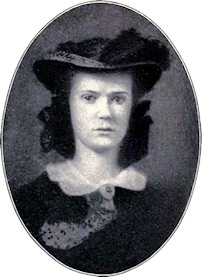August 13th.
I am in despair. Miss Jones, who has just made her escape from town, brings a most dreadful account. She, with seventy-five others, took refuge at Dr. Enders’s, more than a mile and a half below town, at Hall’s. It was there we sent the two trunks containing father’s papers and our clothing and silver. Hearing that guerrillas had been there, the Yankees went down, shelled the house in the night, turning all those women and children out, who barely escaped with their clothing, and let the soldiers loose on it. They destroyed everything they could lay their hands on, if it could not be carried off; broke open armoirs, trunks, sacked the house, and left it one scene of devastation and ruin. They even stole Miss Jones’s braid! She got here with nothing but the clothes she wore.
This is a dreadful blow to me. Yesterday, I -thought myself beggared when I heard that our house was probably burnt, remembering all the clothing, books, furniture, etc., that it contained; but I consoled myself with the recollection of a large trunk packed in the most scientific style, containing quantities of nightgowns, skirts, chemises, dresses, cloaks, – in short, our very best, – which was in safety. Winter had no terrors when I thought of the nice warm clothes; I only wished I had a few of the organdie dresses I had packed up before wearing. And now? It is all gone, silver, father’s law papers, without which we are beggars, and clothing! Nothing left!
I could stand that. But as each little article of Harry’s came up before me (I had put many in the trunk), I lost heart. . . . They may clothe their negro women with my clothes, since they only steal for them; but to take things so sacred to me! O my God, teach me to forgive them!
Poor Miss Jones! They went into her clothes-bag and took out articles which were certainly of no service to them, for mere deviltry. There are so many sufferers in this case that it makes it still worse. The plantation just below was served in the same way; whole families fired into before they knew of the intention of the Yankees; was it not fine sport? I have always been an advocate of peace – if we could name the conditions ourselves – but I say, War to the death! I would give my life to be able to I take arms against the vandals who are laying waste our fair land! I suppose it is because I have no longer anything to lose that I am desperate. Before, I always opposed the burning of Baton Rouge, as a useless piece of barbarism in turning out five thousand women and children on the charity of the world. But I noticed that those who had no interest there warmly advocated it. Lilly Nolan cried loudly for it; thought it only just; but the first shell that whistled over her father’s house made her crazy with rage. The brutes! the beasts! how cruel! wicked! etc. It was too near home for her, then. There is the greatest difference between my property and yours. I notice that the further I get from town, the more ardent are the people to have it burned. It recalls very forcibly Thackeray’s cut in “The Virginians,” when speaking of the determination of the Rebels to burn the cities: he says he observed that all those who were most eager to burn New York were inhabitants of Boston; while those who were most zealous to burn Boston had all their property in New York. It is true all the world over. And I am afraid I am becoming indifferent about the fate of our town. Anything, so it is speedily settled! Tell me it would be of service to the Confederacy, and I would set fire to my home – if still standing
– willingly! But would it?
